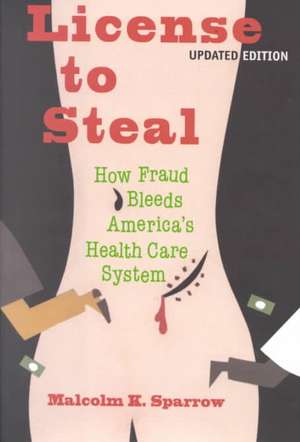License To Steal: Updated Edition
Autor Malcolm K. Sparrowen Limba Engleză Hardback – 9 iun 2000
| Toate formatele și edițiile | Preț | Express |
|---|---|---|
| Paperback (1) | 265.39 lei 6-8 săpt. | |
| Taylor & Francis – 7 dec 2020 | 265.39 lei 6-8 săpt. | |
| Hardback (2) | 223.97 lei 3-5 săpt. | |
| BASIC BOOKS – 9 iun 2000 | 223.97 lei 3-5 săpt. | |
| Taylor & Francis – 7 iun 2019 | 764.20 lei 6-8 săpt. |
Preț: 223.97 lei
Nou
Puncte Express: 336
Preț estimativ în valută:
42.86€ • 44.69$ • 35.62£
42.86€ • 44.69$ • 35.62£
Carte disponibilă
Livrare economică 27 februarie-13 martie
Preluare comenzi: 021 569.72.76
Specificații
ISBN-13: 9780813368108
ISBN-10: 0813368103
Pagini: 304
Dimensiuni: 157 x 231 x 25 mm
Greutate: 0.61 kg
Ediția:Updated
Editura: BASIC BOOKS
Colecția Basic Books
ISBN-10: 0813368103
Pagini: 304
Dimensiuni: 157 x 231 x 25 mm
Greutate: 0.61 kg
Ediția:Updated
Editura: BASIC BOOKS
Colecția Basic Books
Notă biografică
Descriere
This is an explanation of how thieves exploit the U.S. health system and steal more than $100 billion each year. The author examines the effects of managed care on the problem, the government's attempts to grapple with fraud, and the campaign by provider associations to undermine those efforts.
Cuprins
Foreword -- Preface -- Introduction -- Understanding the Fraud-Control Challenge -- The Pathology of Fraud Control -- Particular Challenges in the Health Care Field -- The Importance of Measurement -- Assessment of Fraud-Control Systems -- The Antithesis of Modern Claims Processing -- Current Developments -- Electronic Claims Processing -- Managed Care -- Prescription for Progress -- A Model Fraud-Control Strategy -- Detection Systems -- Conclusion -- Appendix: Site Selection and Interview Subjects

















